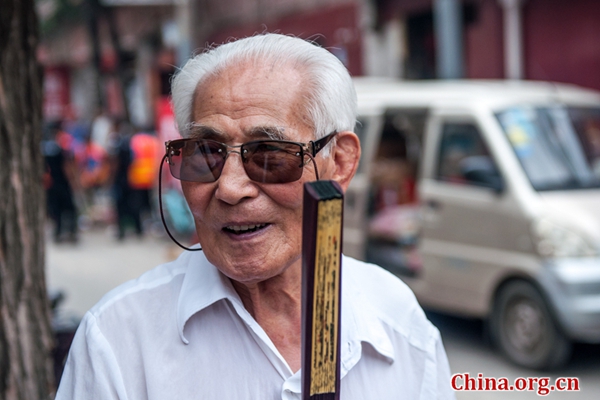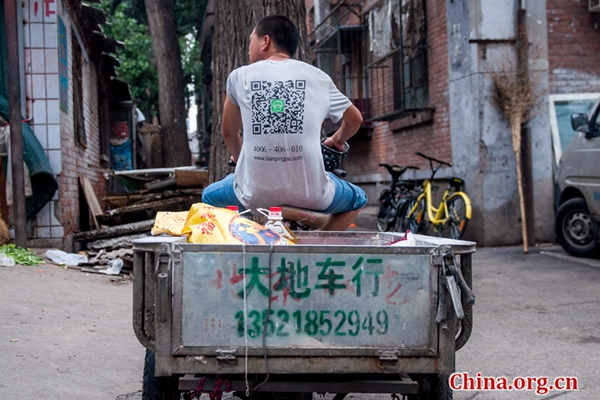Farewell, 'hole in the wall' stores

- By Guo Yiming and Sun Tao
 0 Comment(s)
0 Comment(s) Print
Print E-mail China.org.cn, July 21, 2017
E-mail China.org.cn, July 21, 2017
The practice of modifying residential buildings into commercial use on side-streets has been around since the 1980s, right after the country's reform and opening up efforts which encouraged business development under the market economy transition, said a 88-year old man surnamed Wang who lived in the community near Sanhuqiao South Street for over 50 years.
He told China.org.cn that those illegal small storefronts are a source of a filth and odors creating a disorderly neighborhood and that the renovation and cleanup campaign are long overdue.
|
|
|
An old gentleman surnamed Wang tells China.org.cn that he approves of the cleanup campaign around the neighborhood, saying that it would improve community environment and safety in Sanhuqiao South Street in Beijing's Haidian District. [Photo by Sun Tao/China.org.cn] |
"Small vendors and stalls usually stretched out, clogging sidewalks and motorways and causing safety concerns," Wang complained and was sorry that a previous cleanup campaign conducted years ago failed to solve the problem.
Another old man surnamed Long, aged 83, said that he was already fed up with the messy environment in the street and has been waiting for a long time for a complete overhaul.
"A few years ago, a big fire occurred in the neighborhood and the fire trucks could hardly move in because of the clogged street," revealed Long. "Firefighters could only use a long firefighting pipeline paved across the street to extinguish the fire."
What's next?
While some local residents gave a thumbs-up to the campaign, others may feel nostalgic over the small mom-and-pop stores that had been around over the past two decades.
"It is good to make our community cleaner and neater, but closing off those stores could also cause inconvenience in our everyday life," said a middle-aged woman who declined to reveal her name.
She just bought a small basin in which she could knead dough and make steamed buns, saying that "I need to bake pancakes and steam buns myself since the small workshops are all gone."
She hoped the government can introduce more facilities to fill in the blanks.
According to a measure issued by the Beijing Municipal Commission of Development and Reform in May, from this year to 2019, the city will allocate 200 million yuan (US$29.56 million) in subsidies each year to promote commercial facilities and services like vegetables outlets, breakfast stores and convenience stores.
While some small businesses may close down for good, others are seeking new opportunities to cope with the campaign's aftershock and even grow stronger.
|
|
|
The owner of a grocery store selling grain and oil delivers goods to customers in the neighborhood of Sanhuqiao South Street in Beijing's Haidian District on July 19. [Photo by Sun Tao/China.org.cn] |
Speaking to China.org.cn on his future plans, Xiao Gang (an alias), owner of a small grocery store in the neighborhood, said he would use an O2C platform to promote his business and cope with the shock brought about by the store's close off.
"I already have some frequent customers who are ready to contact me even if my brick-and-mortar store were closed, but I need to employ more marketing strategies online to woo others and sustain the business," he said.








Go to Forum >>0 Comment(s)